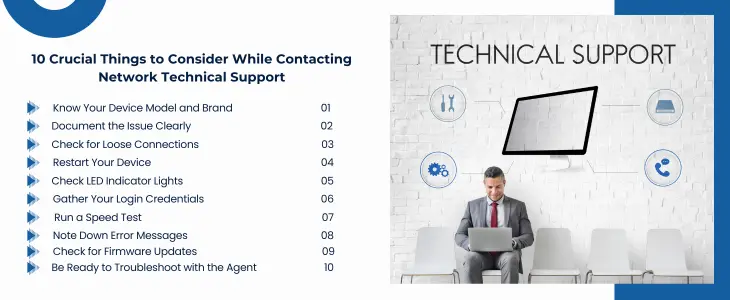10 Crucial Things to Consider While Contacting Network Technical Support
Introduction
Whether you’re facing connectivity issues, slow internet, or device configuration problems, reaching out to network technical support is often the fastest route to resolution. However, to ensure a smooth and efficient support experience, there are several key things to consider before you make the call or raise a ticket.
This guide covers the most important points to check and prepare before contacting network support—saving you time, hassle, and frustration.
1. Know Your Device Model and Brand
Before contacting support, always note down the exact model of your device (router, extender, modem, etc.) and the brand (e.g., Wavlink, Netgear, TP-Link, Linksys, D-Link). Most support teams require this information upfront.
2. Document the Issue Clearly
Create a brief summary of the problem:
- When did it start?
- Is it continuous or intermittent?
- Are all devices affected?
Having this information ready can speed up the diagnosis process.
3. Check for Loose Connections
Ensure that cables and power supplies are properly connected. Many issues stem from simple connectivity problems that don’t require professional help.
4. Restart Your Device
A basic reboot can solve many technical glitches. Restart your router/extender and note whether the issue persists. This is usually the first step technical support will suggest.
5. Check LED Indicator Lights
Observe the LED status lights on your device. Blinking or red lights usually indicate a problem. Share this detail with the support team to help them identify the issue faster.
6. Gather Your Login Credentials
Make sure you have your admin username and password for your router or extender. Support may guide you through settings that require login access.
7. Run a Speed Test
Perform an internet speed test using tools like Speedtest.net and note the results. This will help identify whether your issue is with speed or complete disconnection.
8. Note Down Error Messages
If your device displays any error messages or codes, write them down exactly. They’re often key to diagnosing the problem quickly.
9. Check for Firmware Updates
Visit the manufacturer’s website to see if there are any firmware updates for your device. Updated firmware can fix bugs or improve performance.
10. Be Ready to Troubleshoot with the Agent
Technical support often walks you through troubleshooting steps. Be at your device and ready to follow instructions. Patience and clarity help both sides resolve issues faster.
Conclusion
Proper preparation before contacting network technical support can save time and ensure your issue is resolved efficiently. By following the above steps, you’ll be well-equipped to get back online faster—whether you’re dealing with Wi-Fi issues, extender setup problems, or general connectivity faults.
Frequently Asked Questions (FAQ)
Q1: Why do I need my router model when contacting support?
Support agents require the exact model number to provide device-specific instructions or firmware updates.
Q2: Should I reset my router before contacting support?
Not initially. Try rebooting first. A factory reset should only be done when advised by a professional.
Q3: What information should I share with technical support?
Details like the issue timeline, affected devices, error messages, and LED status indicators are highly useful.
Q4: How can I check if my internet issue is with my ISP or my device?
Connect a device directly to your modem. If the issue persists, it’s likely your ISP. If not, the problem may be with your router/extender.
Q5: Is contacting support via chat better than calling?
Both are effective. Choose chat for easy reference and calling for faster communication.
